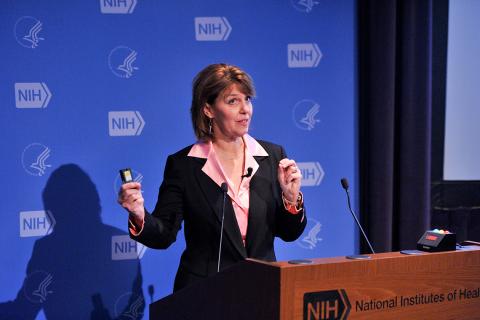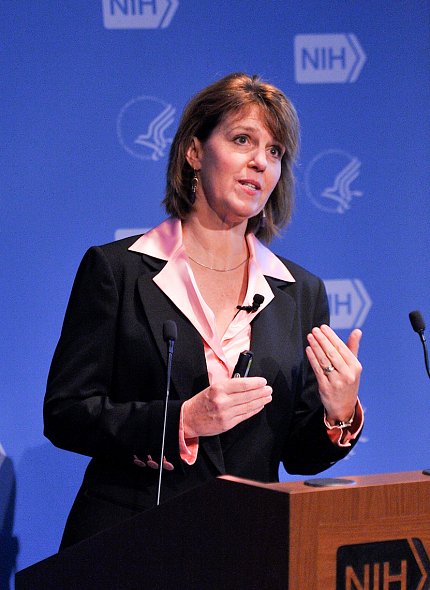VA Model of Care Shows Potential, Gaudet Says

Photo: Marleen Van Den Neste
In a recent NIH lecture, Dr. Tracy Gaudet, who leads an initiative in the Department of Veterans Affairs to deliver more “personalized, proactive and patient-driven care to our veterans,” discussed the foundation and progress of that initiative and the reasons it is bringing hope.
A board-certified obstetrician-gynecologist, Gaudet is the inaugural executive director of the VA’s Office of Patient Centered Care and Cultural Transformation and a prominent speaker and writer on the transformation of health care. She gave NCCIH’s Stephen E. Straus Distinguished Lecture in the Science of Complementary Therapies, which honors the center’s founding director.
Her talk reflected three of NCCIH’s research priorities: chronic pain, emotional well-being as a component of disease prevention and health promotion and pain research in military and veterans’ populations—as through the NIH-Department of Defense-VA Pain Management Collaboratory, led by NCCIH.
Gaudet described current U.S. health care as “find-it/fix-it” and “reductionistic” in its approach, quoting a finding from a National Academy of Medicine report: “The disease-driven approach to care has resulted in spiraling costs as well as a fragmented health system that is reactive and episodic as well as inefficient and impersonal.” The opioid epidemic and the declines in the past few years in U.S. life expectancy may be results, she suggested.
“This is crippling us,” Gaudet continued. “We’re not even getting the health outcomes that we desire. Chronic conditions are our primary burden, largely affected by lifestyle choices. To tell somebody, ‘Exercise more, reduce your stress, see you in a year,’ isn’t working.”

Photo: Marleen Van Den Neste
She places no blame on physicians and other health care providers—who are doing what they’ve been trained to do “with treatments we are blessed to have”—but rather on the system’s limitations: “We have advanced science, clearly and in very big, bold ways, in recent years. But in general, health care has not shifted in the same way. Like all other industries, it’s time to look at that.”
Among the major steps the VA has taken is its new Whole Health System, part of the Veterans Health Administration. As a first step, patients complete an innovative personal health inventory (available on the program website with other tools) that asks them what matters most to them and brings them the most happiness—i.e., what do they want their life, and better health, for? A personal health plan is created and a partnership launched that includes personal mission, self-empowerment and self-care.
“As I see it,” Gaudet noted, “self-care is the big determinant for the future of health care…The person and his or her mission is at the center—not the disease, not the chief complaint. We help people build the skills they need and have the support across time to make changes.”
The model also includes conventional care; complementary care where needed, such as acupuncture and yoga; skills training; and more engagement with the “social determinants of health” such as family, peers who are veterans and activities outside the home.
The concepts in this approach are not new, nor were they invented by the VA, Gaudet emphasized. But they are being delivered in a system redesigned to optimize their impact in one of the nation’s largest delivery systems. Other components include health services research, provider training and employee wellness. The program was initially launched at 18 VA flagship facilities, with more on the way.
Feedback from patients and staff has been positive, Gaudet said. “Clinical outcomes are improving and utilization of mainstream health care is decreasing. But what strikes me most is hearing the theme of hope. Our veterans are reconnecting, discovering more reasons to live and having hope again. That’s pretty amazing!” So is the potential she sees for the nation.
The full lecture is available at https://videocast.nih.gov/Summary.asp?Live=28933&bhcp=1.
